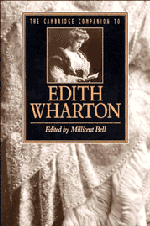Book contents
- Frontmatter
- Introduction
- 1 The Social Subject in The Age of Innocence
- 2 Edith Wharton and the Science of Manners
- 3 Edith Wharton and Race
- 4 The Custom of the Country
- 5 The Female Conscience in Wharton's Shorter Fiction
- 6 Law, Language, and Ritual in Summer
- 7 The House of Mirth
- 8 The Fruit of the Tree
- 9 The Valley of Decision
- 10 Edith Wharton's Valley of Decision
- Bibliography
- Index
- Series List
9 - The Valley of Decision
Edith Wharton's Italian Mask
Published online by Cambridge University Press: 28 May 2006
- Frontmatter
- Introduction
- 1 The Social Subject in The Age of Innocence
- 2 Edith Wharton and the Science of Manners
- 3 Edith Wharton and Race
- 4 The Custom of the Country
- 5 The Female Conscience in Wharton's Shorter Fiction
- 6 Law, Language, and Ritual in Summer
- 7 The House of Mirth
- 8 The Fruit of the Tree
- 9 The Valley of Decision
- 10 Edith Wharton's Valley of Decision
- Bibliography
- Index
- Series List
Summary
Edith Wharton's first novel, The Valley of Decision, is one of her most important and distinguished novels, yet it has received relatively little (and mostly superficial) attention, in spite of its initial popularity. Set in northern Italy in the late eighteenth century, it concerns the decisions that must be made by Odo Valsecca, a young man of liberal ideas who inherits a dukedom during the years of the French Revolution. Forced to choose between conflicting loyalties - those to the forces of social reform with which he allied himself before he came to power, or those of the feudal tradition to which he belongs by blood - Odo must define himself. Readers familiar with the life of Edith Wharton or the themes of her better-known New York books immediately realize the personal investment Wharton had in her hero's ambivalence and self-definition. Through him she was able to speculate about personal commitments and choices behind the mask of a different time, a different place, and a different gender. Adopting experimental poses, assuming various attitudes, and entertaining contradictory ideas, in fiction she could leave nothing resolved except the fact of the book: it existed, it was hers, it was being widely read. In becoming a writer of novels, she had assumed her rightful identity. Working in the medium of politics rather than literature, her hero was not so lucky.
- Type
- Chapter
- Information
- The Cambridge Companion to Edith Wharton , pp. 169 - 198Publisher: Cambridge University PressPrint publication year: 1995

